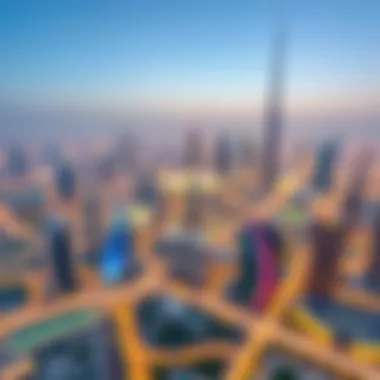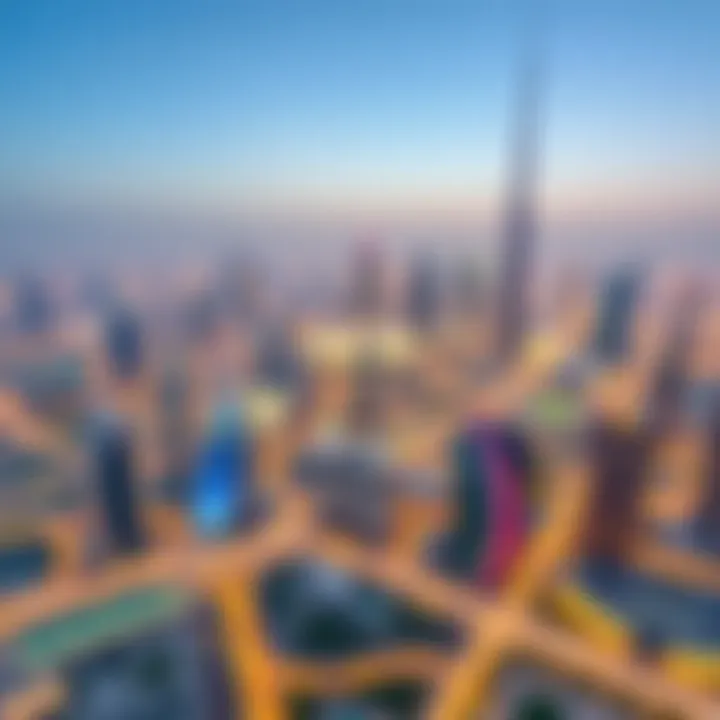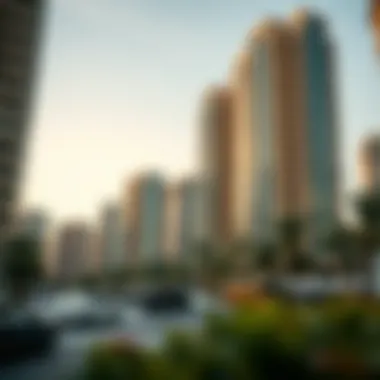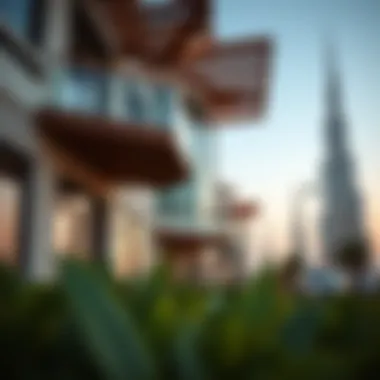Exploring the Expo: Impact on Dubai's Real Estate


Intro
Dubai has always been a melting pot of cultures, aspirations, and opportunities. The recent hosting of the Expo has shined a light on the city, bringing with it a wave of interest in the real estate sector. This event, more than just a grand showcase of innovation and design, has various implications for property owners and potential investors. Historically, world's fairs or expos have altered the economic landscapes of their host cities, setting the stage for long-term transformative changes. In this article, we will explore the significant impact of the Expo on Dubai’s real estate market, recognize the trends shaping the current landscape, and dissect strategies suitable for those keen to navigate this vibrant market.
Market Insights
The Expo has influenced many existing dynamics within Dubai's real estate market. As visitors and investors flock to the city, understanding the pulse of the market becomes crucial.
Current Trends in Dubai Real Estate
Recent trends indicate that demand for residential properties, particularly those near Expo-related infrastructure, has escalated. Areas like Dubai South and the Expo 2020 site have seen increasing property values. As investment pours into these zones, prices surge and expectations soar. A few specific characteristics stand out:
- Rise of Mixed-Use Developments: Projects merging residential, commercial, and leisure spaces attract a diverse group of tenants and buyers.
- Luxury Market Booms: High-net-worth individuals are increasingly seeking luxury villas and apartments with unique amenities.
- Sustainability as a Selling Point: Eco-friendly buildings and developments leveraging smart technology have gained traction, attracting environmentally-conscious buyers.
Key Indicators of Market Performance
To accurately assess market performance post-Expo, looking at specific indicators offers clarity. Here are some noteworthy indicators to keep an eye on:
- Price Appreciation: Comparing pre-Expo and post-Expo property prices, the noticeable increase lends credibility to the optimistic forecasts.
- Transaction Volume: A rise in the number of sales and rentals signals strong market demand and investor confidence.
- Vacancy Rates: Falling vacancy rates in prime locations suggest higher occupancy and increased interest from potential tenants.
In light of these trends and indicators, it is evident that the Expo serves as a catalyst for rediscovery within Dubai's real estate market. Investors and homeowners alike should remain vigilant and informed, capitalizing on emerging opportunities while being aware of risks.
Foreword to the Expo
In recent years, the Expo has emerged as a cornerstone of global cultural and economic exchange. Understanding its significance offers a window into the fast-evolving landscape of Dubai's real estate. The Expo is not just an event. It's a powerful catalyst for development, shaping not only the city’s infrastructure but also its economy and society. This portion of the article will dive deep into the essence of the Expo, carefully dissecting its role as a transformative force in Dubai’s market. By examining what the Expo is and how it fits into the larger tapestry of international exhibitions, one can appreciate the ripple effects it has on various sectors, particularly real estate.
Defining the Expo
The term "Expo" refers to a large-scale public exhibition that showcases innovations in various fields, from technology to culture. Each Expo aims to foster global collaboration and dialogue, presenting nations in a space where they can share their advancements and experiences. The Expo is often themed, focusing on critical issues or developments that unify participating countries and attract global audiences.
For instance, the upcoming Expo 2020—held in 2021 due to the pandemic—puts the spotlight on sustainability, mobility, and opportunity. This focus isn't merely superficial; it influences the kinds of investments and infrastructural projects that flourish in proximity to the event. For potential investors and home buyers in Dubai, grasping these themes provides vital insights into both current and emerging opportunities.
Historical Overview of Expos
Understanding the history of expos sheds light on their evolution and significance in global interactions. The first recognized expo, the Great Exhibition of 1851, took place in London. It was a showcase that introduced innovations from around the world to the public, setting a precedent for international fairs. Since then, expos have taken various forms and themes, reflecting the political, social, and economic currents of their times.
Over the years, expos have introduced significant technological advances. In 1967, for instance, Expo 67 in Montreal highlighted architectural creativity and cultural exchanges, leading to urban innovations globally. More recently, events like Expo 2015 in Milan focused on sustainability and food security, echoing pressing global challenges.
Dubai's selection as the host for Expo 2020 marks a critical moment in this historical lineage. The Expo is expected to not only celebrate the UAE’s ongoing journey but also serve as a platform for dialogue on pressing global issues.
In many ways, the Expo acts as a stage that thrusts the host city into the international limelight, creating opportunities for investment, tourism, and a marked shift in urban development. Therefore, recognizing the significance of expos can better equip stakeholders in Dubai's real estate market to make informed decisions in light of the incoming changes and rapid developments.
The Impact of the Expo on Dubai
The Expo serves as a considerable catalyst for Dubai, shaping not just its economy but also its identity on the global stage. With so many countries participating and showcasing their innovations, the event attracts millions. Thus, understanding the effects of this grand gathering is vital for stakeholders looking to navigate the complexities of Dubai's evolving real estate market. Key elements include economic advantages and cultural dialogues that offer benefits far beyond the event itself.
Economic Boost from the Expo
The immediate economic impact of the Expo can’t be overstated. Dubai expects a considerable influx of tourists, generating millions in revenue for local businesses and boosting demand for hospitality services. This, in turn, leads to an uptick in job creation, from construction to service industries.
Moreover, prior expos have historically resulted in a substantial boost in property sales and rentals. As potential homebuyers flock to the area, stakeholders in the real estate sector can look forward to profit from the increased demand. With new developments sprouting up, the market can anticipate heightened competition.
- Job Creation: In alignment with the Expo, thousands of temporary and permanent positions will likely become available, providing a boost to the local economy. Many skilled laborers and service staff are expected to find new opportunities.
- Infrastructure Development: The Expo often brings with it substantial investments in infrastructure. In Dubai, we’re witnessing the development of transport networks, roads, and facilities aimed at sustaining an accommodating environment for attendees and future residents alike.
As reported by the Dubai Government, the GDP growth forecast during and following the Expo period is anticipated to experience a surge, making this a pivotal moment for investors looking to place their bets on a growing economy. The return on investment in such a scenario is quite favorable.
"Events like the Expo are vital in revitalizing traditional sectors and catapulting new business ventures, making them essential for long-term growth."
Cultural Exchange and Global Connectivity
Cultural exchange is another dimension of the Expo that significantly influences Dubai’s positioning on the world map. Through the merging of minds from countless cultures, the Expo creates a rich tapestry of ideas and innovations. It is often noted that such events foster a deeper understanding and cooperation among different countries.
High-quality discussions regarding art, science, and technology will pave the way for advancements that can inspire not just those present, but future generations as well. Significant conversations may lead to partnerships in various sectors, opening doors for international investment opportunities.
- Strengthening Bridges: Dubai becomes a hotspot for networking as business leaders, innovators, and policymakers come together, potentially leading to agreements that can have lasting impacts beyond the Expo itself.
- Educational Opportunities: The mingling of different cultures creates room for educational growth, influencing both local and expat communities. Local universities might collaborate with international institutions, enhancing educational standards in diverse fields.


When one measures present cultural dialogues against the backdrop of previous expos, it’s easy to gauge the long-lasting positivity in global connectivity and cultural richness. Dubai's canvas is thus continually painted with strokes of diversity, drawing admiration from across the globe.
Real Estate Trends Post-Expo
The Expo has heralded a new phase of transition for Dubai's real estate market, igniting a wave of transformations that are set to change how stakeholders, including buyers and investors, view property in this vibrant city. The Expo has not only showcased Dubai's cultural and economic prowess but has also laid the groundwork for developments that are expected to reverberate through its real estate sector long after the event concludes. Notably, the trends that emerge following such a monumental event carry significant implications, revealing how the marketplace is evolving in response to new dynamics.
Increased Foreign Investment
With the completion of the Expo, Dubai has become a beacon for foreign investors. The event successfully flaunted the city's strengths, offering a spotlight on its infrastructure, hospitality, and cultural heritage. This heightened visibility is drawing interest from around the globe, making Dubai's real estate an increasingly attractive venture. Investors from various regions, such as Asia, Europe, and beyond, see the city as a viable option, not just for residential living but also for commercial enterprises.
Foreign investment is not merely a trickle; it resembles a rising tide. Statistics reflect a steady increase in overseas purchasing activity, especially in prime neighborhoods like Downtown Dubai and Dubai Marina. The diversity of investments is worth noting; they span residential apartments, luxury villas, and sprawling commercial spaces, reflecting a robust confidence in the long-term growth potential of the market. Buyers are now asking questions they hadn't considered before, such as, "What does a robust economy post-Expo mean for property values?" This shift, fueled by increased foreign interest, suggests a concerning trend of price appreciation that could influence local buyer dynamics and competition in the market.
Emerging Neighborhoods
As the Expo provided a clear view of Dubai's available resources and development potential, it has stimulated growth in previously overlooked neighborhoods. Areas such as Dubai South and Al Quoz saw significant investments, transforming their landscapes into emerging hubs.
Local developers are seeing opportunities to capitalize on the Expo’s legacy, driving innovative real estate projects that cater to the tastes of the new generation of homebuyers. Young professionals and families are gravitating toward these areas, looking for affordable options without sacrificing their desire for amenities and connectivity. Neighborhoods like Dubai South, with its proximity to the new airport and the Expo 2020 site, have become particularly attractive.
- Enhanced Infrastructure: The investments in infrastructure, including new roads and public transport, make these neighborhoods more connected.
- Smart City Features: The integration of smart technologies in these emerging areas reflects a forward-thinking approach to urban development.
The narrative here is clear: developers are looking beyond traditional hotspots, setting their sights on places ripe for growth. This not only flattens out regional disparities but also offers a mosaic of living options that cater to different lifestyles.
Long-term Value Appreciation
Investors and buyers alike are keenly aware of another key consequence of the Expo: the potential for long-term value appreciation of properties. The prospect of capitalizing on real estate that appreciates in value over time is a considerable lure. Given Dubai’s successful track record with previous exhibitions, economic forecasts lean toward optimism.
The factors influencing this expected value increase include:
- Heightened Demand: As the city continues attracting global talent and businesses, the demand for housing is expected to remain high.
- Infrastructure Enhancements: Continuous improvements in public utilities and transportation will only amplify property values in well-connected locations.
- Community Development: Initiatives following the Expo include creating vibrant community spaces, enriching the local lifestyle, which in turn makes properties more desirable.
"As Dubai evolves into a global hub, properties in and around newly developed areas could see tremendous value appreciation in the years to come."
Ultimately, the results of the Expo are biomarkers of a shifting market. The fervor around foreign investment, the attention on emerging neighborhoods, and the outlook on value appreciation outlines the transformative effect the Expo has on Dubai, shaping not only its real estate landscape but also the very fabric of its community. Investors, homeowners, and developers cannot afford to overlook these trends as they plot their course in a seemingly bright future.
Shifts in Buyer Demographics
Understanding the shifts in buyer demographics is crucial to frame the future narrative of Dubai's real estate market post-Expo. As different age groups and international buyers become prominent, developers and realtors need to adapt their strategies accordingly. The results of this shift can affect pricing, property types, and even neighborhood planning. Focusing on how these demographic changes influence purchasing decisions, investment motivations, and lifestyle preferences shapes the market's pulse.
Millennials and Gen Z Homebuyers
Individual Preferences
When it comes to individual preferences, Millennials and Gen Z exhibit distinct tastes compared to previous generations. For instance, they tend to favor sustainable living spaces, eco-friendly features, and interconnected communities over traditional models. This inclination matters significantly; the younger buyer demographic is actively shaping the types of properties that enter the market. Their preference for open spaces and amenities geared towards active and community-centered living can drive developments that prioritize these features, making it a smarter move for investors and builders.
One notable aspect of these individual preferences is the desire for convenience. This generation is often looking for smart home technologies and easy access to urban facilities like public transportation and entertainment options. Given the importance placed on a holistic lifestyle, properties that align with these preferences tend to stand out. However, it's worth noting that these features often come with a higher price tag, which can be a barrier for first-time buyers seeking entry into the market.
Investing Behavior
Investing behavior of Millennials and Gen Z also diverges from that of older counterparts. These younger generations are considered more risk-averse but tech-savvy, utilizing platforms for research before making substantial investments. Their approach often leans toward rental investments or shared ownership rather than outright purchases. This shift in investing habits offers unique opportunities for developers who can capitalize on multi-family units or rental yield properties, appealing directly to this demographic.
What sets apart their investing behavior? Many young buyers prioritize location and lifestyle over size and traditional notions of luxury. For example, many are willing to forgo large homes in favor of smaller, well-located spaces that provide easy access to amenities and activities. This inclination can reshape the real estate landscape by putting pressure on builders to innovate in terms of space usage, lease arrangements, and community offerings.
International Buyer Trends
Investment Motivations
Turning to international buyer trends, investment motivations play a significant role in Dubai's real estate scene. Foreign investors are often drawn to Dubai not just for its booming economy, but also for the security and stability of property investments in the region. This draw can be a double-edged sword; while it enhances liquidity in the market, it can also lead to inflation in pricing, particularly in desirable areas, which might exclude local buyers.
When considering motivations, many foreign investors are looking for a combination of lifestyle choice and investment opportunity. Properties that offer beachfront views or proximity to business hubs can draw higher interest. However, investors need to be aware of local regulations and market fluctuations that can impact their returns.
Cultural Preferences
Cultural preferences greatly influence how international buyers engage with the market. Factors such as proximity to schools, cultural institutions, and even shared community values can affect property choices. For instance, Middle Eastern buyers may prioritize communities that provide cultural familiarity, while Western buyers might lean towards modern, minimalistic designs.
This cultural diversity adds layers to investment strategies. Properties designed to cater to various cultural backgrounds can attract a wider range of buyers, supporting community-building efforts while also maintaining property values. However, developers must balance this inclusivity with understanding what features are essential to different groups, as missteps can lead to overlooked opportunities in the market.
"In a rapidly evolving real estate scene, understanding buyer demographics is not just beneficial; it's essential for sustainable growth and resilience in Dubai’s property market."


Government Initiatives and Policies
Government initiatives play a pivotal role in shaping the landscape of Dubai's real estate market. The policies they implement not only steer the direction of investments but also facilitate sustainable growth, which is crucial in the context of the Expo. It offers a framework that supports not only current trends but also hints at future opportunities. As we dive into this section, we will explore key regulatory enhancements and the government's commitment to sustainable development, both of which are central to fortifying investor confidence and attracting a diverse range of buyers.
Regulatory Framework Enhancements
Regulatory enhancements are vital to maintain the integrity and attractiveness of Dubai’s real estate market. The government consistently upgrades laws and policies to ensure they are relevant, effective, and conducive to growth. One significant aspect is the simplification of property ownership laws, especially for foreign investors. This has been a game changer, making it easier for international buyers to participate in the market.
Key regulations include:
- No property taxes: Unlike many cities across the globe, Dubai does not impose property taxes, making it an appealing destination for investors.
- Longer-term visas: Policies like the golden visa program grant residency to investors who meet certain conditions, planting roots and fostering a sense of community.
- Transparent transactions: The government has leaned into technology to create a more transparent buying process, utilizing blockchain to enhance security and trust in property transactions.
These initiatives not only mitigate risks for investors but also assure stakeholders of the long-term stability of their investments. Without a doubt, the regulatory framework enhancements have made Dubai a vital player in the global real estate arena.
Support for Sustainable Development
Moreover, the government’s push towards sustainable development is noteworthy. The Expo itself has underscored Dubai's commitment to showcasing innovation and sustainability. There are several initiatives in motion:
- Green building regulations: The local government mandates that new constructions adhere to strict energy efficiency standards. This ensures not only lower operational costs for homeowners but also aligns with global trends towards sustainability.
- Eco-friendly projects: Development of entire neighborhoods that prioritize green space, renewable energy, and smart technologies is reinforcing Dubai’s green ambitions. Such projects appeal especially to environmentally-conscious investors and homebuyers, catering to a market that increasingly values sustainability.
- Public transportation networks: Investments in infrastructure, such as the expansion of public transport, promote sustainable commuting options, laying down the pathways for smart, urban living.
In summary, the government's initiatives serve not just to alleviate market fears but also to align Dubai’s real estate policies with global trends towards sustainability and transparency. As such, these policies are making waves, beckoning investors who are not just looking for profits but also for responsible investment opportunities.
Urban Development and Infrastructure
Urban development and infrastructure serve as the backbone of any thriving metropolis, and Dubai is no exception. With the Expo enhancing its global profile, the emphasis on development has significantly ramped up. Investments in infrastructure lay the groundwork for economic and social benefits that ripple through the entire community. This section illuminates the critical aspects surrounding Dubai's ambitious urban development projects and infrastructure enhancements, showing how these efforts converge to create a more livable, efficient city.
New Transportation Projects
One cannot overlook the significance of transportation in any city, particularly in a bustling hub like Dubai. With the Expo attracting millions of visitors, enhancing connectivity becomes paramount. Current and upcoming transportation projects aim to improve movement across the city, making daily commutes smoother for residents and travelers alike. The expansion of the Dubai Metro system, which is a game-changer for many, now includes additional stations linking to key areas like Dubai World Trade Center and the Expo site. This is not just about convenience; it’s about economic vitality.
- Metro Expansion: With new routes and stations being planned, this expansion covers more ground while reducing congestion on the roads.
- Road Infrastructure: There are significant upgrades to major roads, which include new lanes and improved traffic control systems. These upgrades are intended to reduce travel time, thereby enhancing productivity.
- Public Buses and Taxis: Updates in the public transport sector include the introduction of eco-friendly buses and an increase in taxi availability to serve the growing population.
These projects also align with the city’s climate goals by reducing the overall carbon footprint associated with private vehicle use. Not only does improved public transport boost convenience, but it enhances accessibility for everyone, including visitors to Expo.
Smart City Initiatives
As cities evolve, the integration of smart city concepts isn't just a trend; it’s a necessity. Dubai’s push towards becoming a smart city is reflected in multiple innovative initiatives aimed at using technology to optimize urban living. These initiatives are designed to improve resource management and enhance the quality of life for residents.
Efforts include:
- Smart Traffic Management Systems: These use real-time data to monitor traffic conditions and adjust signals to manage flow more effectively, aiming to cut down on both congestion and emissions.
- Sustainable Energy Solutions: Solar energy installations across the city are becoming more commonplace, reducing reliance on traditional energy sources.
- Connected Communities: Through high-speed internet and IoT devices, residents have better access to services and can interact more efficiently with local governments and businesses.
"Smart initiatives not only help in managing the urban landscape more effectively but also contribute to a sustainable future for Dubai."
By focusing on sustainability and technology, Dubai positions itself not just as a leader in the region but as an example for other cities worldwide. These developments are crucial to adapting to future challenges, ensuring that the real estate market remains resilient. As infrastructure projects progress and smart solutions take root, investor confidence is likely to be positively impacted, creating fertile ground for growth in real estate.
The Role of Innovation in Real Estate
Innovation in real estate stands as a cornerstone for shaping future landscapes, especially within dynamic markets like Dubai. This sector, often bogged down by tradition, is experiencing a shift propelled by technology and sustainability. Not only does this influence the way properties are developed and managed, but it also redefines how investors engage with these opportunities. The Expo acts as a catalyst, driving these innovations forward, which can lead to more streamlined processes, heightened efficiency, and enhanced living experiences.
Technological Advancements
In the ever-evolving realm of real estate, technological advancements are becoming less of a novelty and more of a necessity. The introduction of smart home technologies, for example, offers homeowners unprecedented control over their living environments. Imagine a system where the temperature adjusts automatically based on patterns or where lights switch off with a simple voice command.
On top of that, the integration of virtual reality (VR) and augmented reality (AR) has transformed property viewings. Instead of physical walkthroughs, potential buyers can take a virtual tour from the comfort of their own homes, significantly widening the audience for listings. This tech-savvy approach is about making transactions smoother and more efficient, ultimately attracting a younger clientele more comfortable with digital interactions.
Blockchain technology is another game-changer in real estate transactions. It provides a level of transparency and security that traditional methods simply cannot match. By creating an immutable ledger, buyers and sellers can track property history without the uncertainties of manual records, reducing fraud risks. As these technologies permeate the market, it is clear that adapting to these innovations is no longer optional but vital for stakeholders aiming to stay competitive.
Sustainable Building Practices
As the world becomes increasingly aware of environmental issues, sustainable building practices gain traction, directly affecting the future of Dubai’s real estate. Not only do these practices cater to environmentally conscious buyers, but they also align with governmental initiatives aimed at promoting sustainability. Building with recyclable materials, implementing energy-efficient systems, and reducing carbon footprints are essential steps toward ensuring that new developments are not only economically viable but also ecologically responsible.
One innovative practice is the use of green roofs which not only improve insulation but also contribute to biodiversity within urban settings. Moreover, by harnessing solar energy through panels, buildings can significantly reduce their energy dependency. While the initial investment in sustainable practices may seem steep, they promote long-term cost savings and higher property values.
Investors are now looking beyond immediate returns; they want properties that hold lasting value through sustainable practices.
"Sustainability is not just a trend; it’s a commitment to future generations, making it an investment rather than a cost."


Such practices also reflect a broader cultural shift in Dubai's real estate landscape, where the community increasingly prioritizes wellness, safety, and environmental responsibility.
Challenges and Considerations
Understanding the challenges and considerations surrounding Dubai's real estate market is crucial, especially in the wake of the Expo's influences. As stakeholders navigate this evolving landscape, they grapple with a range of factors from market volatility to geopolitical dynamics that shape the investment climate. Addressing these issues is vital for sound decision-making, ensuring that investors can mitigate risks while capitalizing on emerging opportunities.
Market Volatility
Market volatility in Dubai's real estate sector can leave investors feeling like they're on a rollercoaster. Prices fluctuate due to a multitude of reasons, from economic shifts to changes in global sentiment. This uncertainty demands vigilant monitoring.
For instance, after the Expo, a surge in demand could sharply affect property values. If suddenly everyone wants a slice of Dubai, we might see prices spike. Yet, it's a double-edged sword. Overvaluation can lead to a crash, reminiscent of the 2008 financial crisis when prices plummeted in a matter of months. Investors should consider these historical contexts when making strategic moves.
- Strategies to Mitigate Volatility:
- Diversification: Spreading investments across different types of properties can cushion against potential losses.
- Market Research: Continuous analysis of trends helps in predicting potential downturns.
- Long-term Focus: Instead of panicking with fluctuations, having a long-range view can yield better outcomes.
Despite the risks, there's always potential hidden beneath the surface. The trick is to remain informed and adaptable.
Geopolitical Factors
Geopolitical factors play an enormous role in shaping Dubai's real estate market. With regional tensions or shifts in international relations, the stability of the real estate sector can be threatened. For instance, trade disputes or conflicts can lead to changes in foreign investment flows, which are crucial for Dubai's economy.
An illustrative case is the impact of the ongoing tensions in the Middle East. If neighboring countries face sanctions or political instability, investors might look elsewhere, affecting property demand and pricing in Dubai. Additionally, when global powers react to such situations, their policies can ripple through the market, creating fluctuations that can be challenging for stakeholders to predict.
- Key Considerations Include:
- Understanding Regional Dynamics: Keeping up with local and international news can provide insights into potential risks.
- Assessing International Trade Relations: As trade evolves, so do investment opportunities.
- Political Risk Assessment: Investors must assess the political landscape regularly to gauge how it might affect their investments.
Future Outlook for Dubai's Real Estate Market
The future landscape of Dubai's real estate market lies at a fascinating intersection of opportunity and transformation. The Expo has undoubtedly acted as a powerful catalyst, reinventing how we see property investment in the city. Investors, homeowners, and other real estate stakeholders must grasp the forthcoming trends and implications that shape the market. The considerations associated with the outlook are crucial, as they substantially benefit all involved parties and help paint a picture of what's to come.
Stability and Growth Projections
As Dubai strides forward in its post-Expo journey, it's essential to consider the stability and growth projections of the real estate market. Numerous analysts echo sentiments of optimism. For instance, various reports indicate a likely increase in demand for residential and commercial spaces as the city welcomes new international businesses and tourists.
- High Demand Sectors: Key sectors, such as hospitality, residential, and retail, are poised to see considerable demand spikes.
- Sustained Investors Interest: Local and foreign investors remain interested, seeking viable opportunities stemming from the Expo’s burgeoning ecosystem.
- Economic Indicators: Recent GDP forecasts place Dubai at a growth trajectory, further indicating an environment ripe for real estate investment.
The stupendous event has set the stage for a long-lasting impact. More people are looking to settle down in Dubai, turning this city into a magnet for newcomers from around the globe. In short, investors have ample reason to keep their eyes peeled for new projects and properties, especially in neighborhoods that are evolving post-Expo.
Building a Resilient Market
To future-proof Dubai's real estate market, building resilience is key. Resilience demands adaptability in face of potential challenges, and a few critical strategies will define how stakeholders navigate future obstacles.
Here are a few notable components:
- Sustainable Practices: Embracing sustainability will be vital. Developers are now focusing on incorporating eco-friendly building materials and energy-efficient systems, aligning with global sustainability goals.
- Technology Integration: Leveraging smart technology in homes and commercial spaces can enhance living experiences while increasing operational efficiency, which will be a significant draw for potential buyers.
- Marketplace Diversification: As the market evolves, diversifying investments beyond traditional property like residential units into mixed-use developments can reduce risks related to market fluctuations.
"A resilient market does not simply react to challenges but anticipates them, evolving into a stronger entity."
Looking beyond the immediate horizon, creating a flourishing environment for innovation and crafting a sustainable future will help solidify Dubai’s place as a top global destination for real estate investment. Interested stakeholders should proactively research ongoing developments and engage in conversations about emerging trends.
To summarize, the Expo has not only boosted Dubai's global profile, but it has also laid the groundwork for promising stability and growth, setting the stage for a resilient real estate market that responds dynamically to unfolding circumstances in the years to come.
Ending
Reflecting on the content presented throughout this article, it’s clear that the Expo stands as a pivotal event in shaping Dubai's real estate landscape. This conclusion stitches together the threads of insights explored earlier, reinforcing their significance for various stakeholders within this dynamic market.
The importance of this conclusion lies in its ability to summarize critical findings while also projecting the future implications that stem from these observations. Investors should grasp how Expo’s legacy translates into real estate potential; they must be equipped with an understanding of both the immediate outcomes and the long-term trajectories that could arise.
With an increasing inflow of foreign investments and demographic shifts favoring younger buyers, the landscape is evolving noticeably.
Recap of Key Insights
- Economic Uplift: The Expo creates myriad opportunities for growth, acting as a catalyst for increased economic activities and potential property value hikes.
- Cultural Dialogue: It nurtures an environment of global exchange, thereby enriching the local cultural fabric which, effectively, adds intangible value to residential and commercial properties.
- Investment Trends: Various segments of buyers are showing a marked shift towards emerging neighborhoods, driven by both lifestyle preferences and affordability.
- Government Support: Initiatives aimed at sustainability and infrastructure development are bolstering the market's resilience, addressing future market volatility considerations.
These insights foster a comprehensive understanding of how the Expo is poised to influence Dubai's real estate market, not merely as a fleeting event but as a significant juncture in its ongoing transformation.
Implications for Stakeholders
- For Investors: Understanding these dynamics is essential not just for investment planning but also for aligning strategies with evolving buyer demographics and preferences.
- For Homeowners: They must evaluate their positions in a rapidly changing market, considering both upsides in property values and potential challenges from increased competition.
- For Realtors and Developers: It’s imperative to adapt to shifting demands, ensuring property offerings meet the nuances of an audience eager for sustainable and technologically-advanced living environments.
- For Analysts: Continuous monitoring of patterns established by Expo-related developments will be crucial in informing reports and forecasts that stakeholders rely on to navigate future uncertainties.
In sum, the Expo's implications reach far beyond the immediate effects; they pave the way for a potentially transformative era in Dubai's real estate market. Understanding these elements aids in strategic planning and navigation of the complexities that lie ahead.







